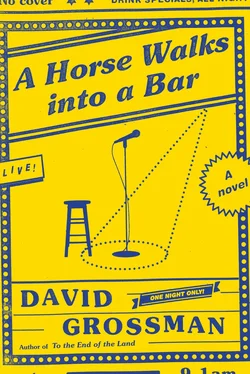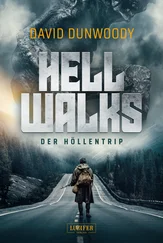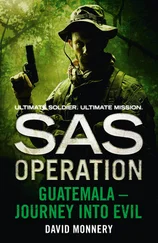“ ‘Wildlife,’ I say quickly to the driver. It comes out in a shout. And the driver says, ‘Wildlife…Wildlife…’ And even that word gives me a zap in the heart. Maybe it was a bad sign that I said it. Everything seems like a sign suddenly. Maybe even breathing is a sign.
“ ‘I’m on it,’ the driver goes. His lips move, and I can see his brain starting to work. ‘Okay. Got one. A little baby koala bear stands on a branch, spreads his arms out, jumps off, crashes on the ground. Picks himself up, climbs all the way back up, stands on the branch, spreads his arms, jumps off, and crashes. Picks himself up again, climbs up, does the whole thing over and over again. This goes on and on, and the whole time two birds are sitting over on the next branch watching him. Finally the one bird says to the other, Look, we’re going to have to tell him he’s adopted.’ ”
The audience laughs.
“Ah, you’re laughing! Nice city, Netanya. I wouldn’t say you’re exactly rolling around, but laughter was certainly registered. It’s too bad you weren’t in the car instead of me, you would have made the driver happy. Because me, I just sit there without laughing or anything, just shaking like a dog in the corner of the pickup, and my first thought is why is he telling me a joke about parents and their misfit kid? But the driver, the second he finishes telling the joke, he starts laughing himself. But I mean, he really goes at it. Sounds like a donkey braying. Honestly, his laughter is way funnier than the joke. Maybe that’s why they took him for the contest. I didn’t laugh, and I could tell he was disappointed, but he wasn’t about to give up. I couldn’t get over how he didn’t give up. How can someone be so dense? I thought.
“ ‘Okay, here’s one that kills me,’ he says. ‘Every time I tell it I have to stop myself from cracking up, ’cause they disqualify you for that. A horse walks into a bar and asks the barman for a Goldstar on tap. The barman pours him a pint, the horse downs it and asks for a whiskey. He drinks that, asks for a tequila. Drinks it. Gets a vodka shot and another beer…’ This driver guy is prattling on with his thousand and one nights, and all I want is to get away from him, and my head is bouncing against the windowpane, and through the shaking I suddenly hear this voice from a distance, from the desert, and it’s hard to hear exactly, but it’s a bit like a song Mom used to sing me when I was little, three or four, I guess. I have no clue where it came from, I swear it wasn’t from me, I hadn’t thought of that song for years, she used to sing it when I couldn’t fall asleep, or when I was sick, she’d pick me up, rock me back and forth, Ay li luli lu, schlaf mein tiare schepseleh, mach tzu di kleine eigelech… ”
The room falls silent. The little tune evaporates like a curl of smoke.
“Now think about him.” He shakes himself off and sternly presses on. “Good things, good things, think good things about him, where, what, here, got it, soccer players, run the players through my mind by team, first Israeli teams, then Europeans, then South Americans. I was a champ at that, thanks to him, so whatever comes to mind that’s fine. From age five, from when I went into first grade, he started teaching me about soccer. He put his heart and soul into it. Okay, enough, now it’s her turn. But she’s not coming. He keeps jumping into my head again. Every time I think something about her—there he is. What now? Standing in the kitchen frying an omelet, maybe that’s a good sign, a sign that he’s at home and everything’s okay with him, and then I catch myself: How is that a good sign, you dumbass? How could you possibly think that’s a good sign? Then he looks up from the omelet at me and grins like you grin for a camera, and he does his trick, he flips the omelet in the air and holds his other hand up high like a conductor, and suddenly it looks like he’s sucking up to me a bit, but why would he do that? What could he need from me now? It’s got nothing to do with me. But he keeps looking at me like it is about me, and I beg him to go away, to stop scaring me, what does he want from me? I wish he would at least not come alone, I don’t want either of them coming on their own now. But noooo—not only doesn’t he leave, he gets even more stuck there. Now he shows me himself in the jeans room, I told you about that place, and there’s a table there with a square mesh and a long saw stuck to the table vertically—”
His voice gets raspy. He takes a sip from the flask.
“Why the saw? Who asked that? Oh, well hello there, table twelve! You’re a teacher, aren’t you? I can tell from your accent. Why the saw, you ask? But all the rest sounds plausible, does it, Miss Teacher? Three hundred pairs of velveteen pants from Marseille reeking of fish, which turned out to have the zippers on the back— that makes sense? And sending a kid of barely fourteen off like that without—”
His eyes are bloodshot. He makes a long exhalation with his cheeks puffed out and shakes his head from side to side. My own throat starts to burn. He drinks again. Big, fast gulps. I must remember what I was doing all that time in Be’er Ora while he was on his way to a funeral. But how can you remember details like that after so much time?
Nevertheless, I take myself out of this place. I have to put some order into things. I exhort myself. No discounts. With all my might I try to revive within me the boy I was then, but he keeps crumbling in my consciousness, refusing to be held, to exist, to be subjected to this investigation. I don’t give up. I put all my strength into those minutes. They’re not easy, these thoughts. Dovaleh still isn’t talking. Maybe he senses that I’m not listening to him. But I force myself to at least ask the requisite questions: Did I think about him every few hours, after he left the base? I don’t remember. Or once a day at least? I don’t remember. When did I realize he wasn’t coming back? I don’t remember. How did it not occur to me to find out where he’d been taken? And did I feel relieved that he was gone, or glad, even? I don’t remember. I don’t!
All I know is those were the first days of my love for Liora, which dulled any other emotion or thought. I also know that after camp I did not go back to the math tutor. I informed my parents that I wasn’t going back under any circumstances. I spoke firmly, with a boldness that alarmed them. They gave in, they folded, they blamed it on Liora’s bad influence.
He stretches his arms out to the sides as far as he can, and his smile stretches with them. “But I’ll tell you, Miss Teacher, you’ll be surprised to learn that the saw actually did have a purpose. Because Daddy-o the tycoon dabbled in the fabric business. Yes, yes, with his own two hands he created his own brand in the field of recycled textiles, schmattes -dot-com. He bought and sold rags, a noble occupation for his free time, during lunch hour at the barbershop, another prestigious enterprise…”
There’s been a rustle in the audience for a few moments. It’s hard to tell exactly where it’s coming from. Almost everyone I look at seems fascinated by the story and by the storyteller—fascinated despite themselves, perhaps, sometimes with an expression of aversion, even terror. Yet there is a hum, as if from a distant hive, that has been rising from the crowd for a few minutes.
“He used to drive around Jerusalem’s neighborhoods on his Sachs moped buying rags, old clothes, shirts, pants…” He can hear it too now. His voice crescendos into the familiar ragman call: “Alte zachen!” He bribes the crowd unabashedly, feverishly, desperately: “Blaaan-kets, liiiiin-ens, tooooo-wels, coooom-for-ters, diiiiiiia-pers…After he washed them, he’d sort them out by fabric and size.” The hum is now a murmur coming from all around the club, lapping in from every direction. “And what he did then—listen up, my friends, I’m getting to the point, don’t go anywhere—he’d sit on the floor in the jeans room and deal out the rags like a deck of cards, superquick, one for you, one for you, chop-chop, a pile of this kind and a pile of that kind, it was a real undertaking, don’t look down on it, and then he’d run the shirts and pants and coats from top to bottom on the saw and cut out the dregs, all the buttons and zippers and clips and buckles and snaps, they’d all fall onto the mesh—but don’t worry, those he sold to a tailor in Mea Shearim, nothing was wasted in his universe—and then he’d pack up the rags in bundles of a hundred, I used to help him with that, I liked it, we’d count together, Acht un neintzik, nein un neintzik, hundert! And we’d tie the rags up together really tight with twine, and off he’d go to sell them to auto shops, printing houses, hospitals…”
Читать дальше












